Return to Paradise:
By Jaco van Jaarsveld, Johannesburg, South Africa
I heard a statistic the other day that there are more fly shops per area in
Johannesburg, than anywhere else in the world. Believable since most of
the economically active population is concentrated in the cities, with
Johannesburg being the mostly populated in South Africa. An accordingly,
the fly fishing community. What is encouraging about this phenomenon is
that the fly fishing industry is healthy here and that we have access to the
best products on the market, at ridiculous prices ($ 1 = R 7.40), but none the less.
Coupled with the "African Renaissance," a joint venture between us and our
sister countries, we now (finally) have access to some of the best and often
uncharted, fishing waters Mother Earth has to offer. The Renaissance further
encourages cross investment between the countries, which in turn creates
business opportunities for tour, travel and holiday operators. With the historic
reality of many African countries and the way it went, investment and development
is a slow and tedious process demanding broad shoulders and, more often than
not, deep pockets. Which is a blessing in disguise. Untouched wilderness and
waters will remain so for some time with only a few developments opening up
in an area, translating to a holiday/fishing experience we all dream about.
One such country is Mozambique. Renowned in South Africa for its beautiful
beaches, warm seas and excellent fishing, this country now offers visitors access
to an era dating back a few hundred years. Despite the war between Renamo
(rebels) and Frelimo (government) that concluded a few years back, life outside
cities hasn't changed much from the way it has always been. The war being an
irony when meeting the small communities in the countryside, peaceful and
beautiful people living simple lives under canopies of Coconut trees.
My fishing partner, Shayne, and I recently visited the province of Inhambane,
about 500km's north of the capital Maputo. We stayed at Guinjata Bay lodge
about one hour's drive from the town of Inhambane. To get the most out of the
five days we could muster for the trip, we flew in with Eagle Air Charters, a
comfortable two hour flight direct from Johannesburg International airport. The
experience begins at the Inhambane airport. On arrival you see a warehouse and
a small building next door. Yup, the airport. Once through customs, a charming
lot, we met with Bernie (co-owner of Guinjata) in the Game Viewing vehicle for
our transfer to the lodge. Reluctant to leave the vehicle were guests of the lodge
on their way back to South Africa. And among them, two fly fishermen who had
that same morning caught a 11.5kg King Mackerel (Scomberomorus Commerson).
Trying to politely subdue our somewhat childish excitement (veering to blatant
panic levels at times), we set out to the lodge. Alas, paradise waits.
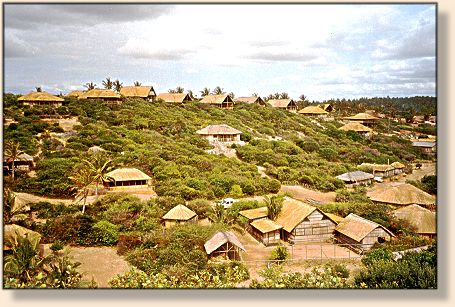
That evening was spent with Bernie and Paul, our hosts and some of our
fellow guests sampling the local beer, 2M around the dinner table – not
recommended for weight conscious, fashion magazine readers of society!
Reminiscing tales of legendary fishing experiences (a 43.8kg Kingfish
Trevally – Caranx Ignobilis) world record caught
just off the reef dons the entrance to the pub) and tactics flavored the
conversations with new friendships being forged and challenges issued.
We eventually wobbled to hot showers and a very deep sleep, our
dreams riddled with battles waged against monster Kingfish.
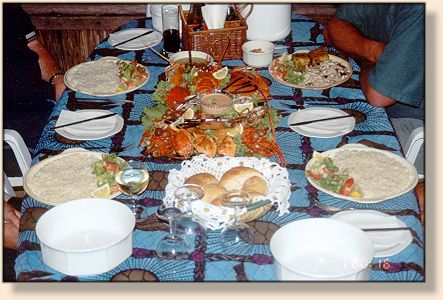
We were on the water just after six the next morning with perfect conditions
welcoming us. The reef running along the beachfront harbors all the game fish
species fly fishers yearn to catch and varies from around 3 to 40 metres in
depth. We started the morning by chasing birds diving into the bubbling
chaos of predators hunting, but couldn't hook anything sizable. None the
less we had fun with a few Mackerel Tuna (Euthynnus Affinis),
Needlescaled Queenfish (Scomberoides Tol) and small
Dusky Jacks (Caranx Sexfasciatus).
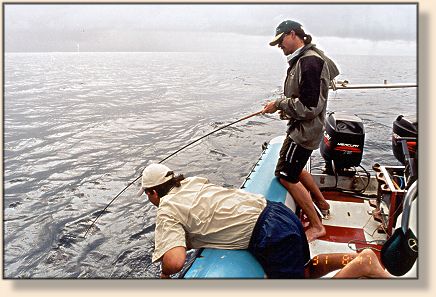
Mid-morning we decided to change tactics hunting for Mr. King himself. The
current runs along the reef from south to north with deep caverns where the
big fish hold, waiting for passing baitfish. We employed two tactics. Drifting
with the current, we'd cast up current, allowing enough time for the line to sink
to the bottom before ferociously stripping back. This tactic afforded us a Mackerel
Tuna (2kg) and a few smaller Needlescaled Queenfish. The other method was to
slowly idle against the current, again casting up current, letting the line sink,
flow past the boat and then strip, effectively increasing the "speed" of retrieval.
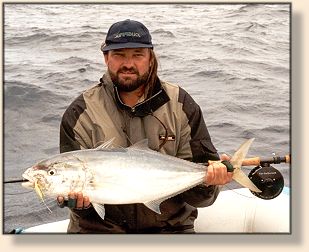 At around 11 am Shayne hooked something on a Chartreuse Klouser that made
his reel smoke and us paying an unplanned visit to Madagascar (or Australia)
seem highly likely. His twelve weight buckled with repeated runs until, after
twenty minutes of battle, the Bludger (Carangoides Gymnostethus)
finally surrendered. A beautiful 6kg specimen graced us with his presence.
Then, as Murphy would have it, the wind picked up and we went for lunch.
Our assessment of the reef, plenty fish.
At around 11 am Shayne hooked something on a Chartreuse Klouser that made
his reel smoke and us paying an unplanned visit to Madagascar (or Australia)
seem highly likely. His twelve weight buckled with repeated runs until, after
twenty minutes of battle, the Bludger (Carangoides Gymnostethus)
finally surrendered. A beautiful 6kg specimen graced us with his presence.
Then, as Murphy would have it, the wind picked up and we went for lunch.
Our assessment of the reef, plenty fish.
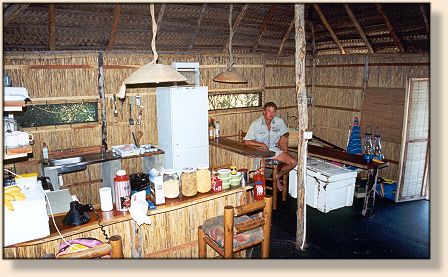
Fishing from the beach also provided much entertainment. From the balcony
by the pub area we spotted a school of baby Kingfish patrolling the bay right
in front of the lodge, but missed the opportunity by the time we hit he water.
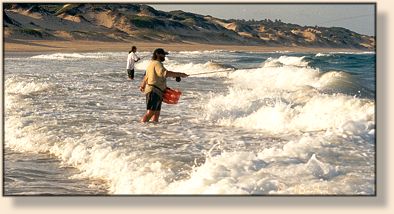
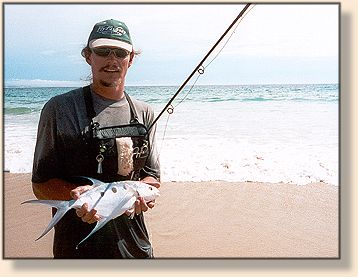
Over the few days that we were there, I noticed the most activity during the
tide going out, confirmed by Bernie and Paul as the best times to fish. However,
we had some Wave Trevally chasing our flies at low tide from a gully/channel,
but didn't get any hook ups. We played around with our 8 weights in the surf
having much fun with Wave Trevally and Threadfin. As opposed to casting the
water to froth in one spot, we wandered up and down the beach in search of
fish. Both pink and chartreuse Crazy Charlies worked extremely well for these
beautiful creatures. The local fishermen not understanding how we could release
them, once landed.
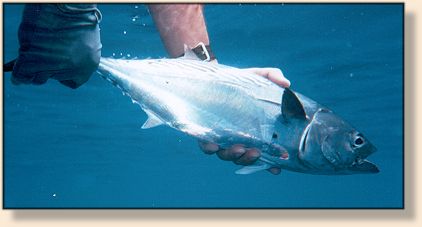
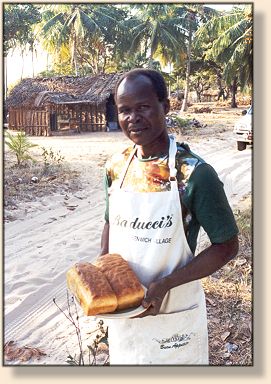 Sightseeing the area is also a worth while excursion. We went to the "top of
the world" for sundowners, wallowing in the thrills of Humpback whales going
aerial not 300 meters from us while gawking at the beauty of a land untouched
by the scarring spills of western development. The local baking industry, a crude
oven under a canopy of coconut trees, not only provides a little entertainment,
but tasty treats of freshly baked, hot Portuguese bread. We went for long walks
on endless beaches and marveled at the crude fishing tactics of the local fishermen,
an art perfected with the arrival of stainless steel hooks, fishing line and lead sinkers.
How they use these "modern" tools is another story all together…
Sightseeing the area is also a worth while excursion. We went to the "top of
the world" for sundowners, wallowing in the thrills of Humpback whales going
aerial not 300 meters from us while gawking at the beauty of a land untouched
by the scarring spills of western development. The local baking industry, a crude
oven under a canopy of coconut trees, not only provides a little entertainment,
but tasty treats of freshly baked, hot Portuguese bread. We went for long walks
on endless beaches and marveled at the crude fishing tactics of the local fishermen,
an art perfected with the arrival of stainless steel hooks, fishing line and lead sinkers.
How they use these "modern" tools is another story all together…
I sit here now in my office dreaming about our short time in this remote paradise,
still feeling the takes and rebellious pulls of my trophies, the fumbling on the boat
(fish fever) when the water all around us start to bubble and churn with the
scattering of baitfish, the thrill of my fly being chased, refused, chased and . . . and we
are going back. Our next trip is planned for May 2001, a three week holiday
and hopefully, we'll see you there!
Bernie or Chrisna can be reached at guinjata@mweb.co.za
and will happily make all arrangements you require.
If you want to ask me some questions my address is green@mighty.co.za
~ Jaco van Jaarsveld
Previous Africa articles
|

